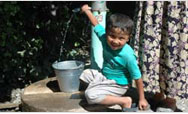You are here » Home » Telling Our Story
Case Study
Engaging ethnic minority youth in civic life
Ethnic Youth Learn About Government

| |
Photo: ALPE
|
|
A group of ethnic Armenian students from the Samtskhe-Javakheti region meet with Education Minister Kakha Lomaia in Tbilisi.
“When we met with members of Parliament, I thought that they would talk only about studies. I was very surprised when they sat with us in a circle and took an interest in our lives,” said Nikolai Manvelian, 15, an ethnic Armenian student.
|
Challenge
For many of Georgia’s ethnic minorities, which include Armenians, Azeris, Greeks, Kurds, and Russians, what goes on in their country’s government is somewhat of a mystery. Language barriers are a big part of the problem. Most national media and legislation are available only in Georgian, yet much of the ethnic minority population does not speak Georgian. In schools, where civic education begins, there are few educational resources for teaching children about their government and even fewer in languages other than Georgian.
Initiative
In 2004, USAID sponsored a project in partnership with a local group, the Association of Public and Legal Advice, to launch the Learning Democracy Project. The effort aims to demystify the Georgian government for youth in Georgia’s ethnic minority regions. Through the project, schoolchildren and teachers from Georgia’s minority regions have the opportunity to travel to Tbilisi and discuss issues that are important to them with government and parliamentary officials. The schools also receive educational materials to help them develop civic education programs in the future.
Results
Students and teachers from 12 non-Georgian language schools participated in civic education field trips. The groups came from schools throughout Georgia, as well as from Armenian, Azeri, and Russian-language schools in Tbilisi. Over 440 children ages 12 to 17 toured Parliament, Supreme Court, and the Ministry of Education and Science. Through translators, they participated in roundtable discussions with government officials, including the Education Minister and Members of Parliament. Students directly posed questions to government officials and discussed the problems that their schools face. The students returned to their schools as civic ambassadors – they learned about their government, and began conveying what they learned to their peers. It will still take time before Georgia’s ethnic minorities fully integrate into the country’s political system, but a small slice of the next generation can now lead the way.
Print-friendly version of this page (373kb - PDF)
Click here for high-res photo
Back to Top ^ | 

